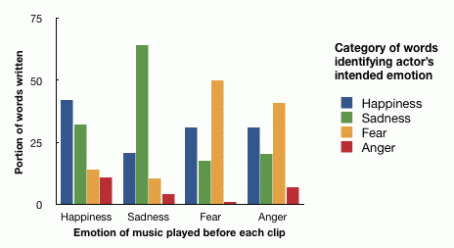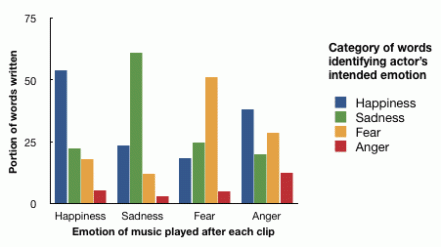From the pulsating terror achieved in films like Psycho and Jaws, to the triumphant victories in Star Wars and Pirates of the Caribbean, it’s hard to think about a great film without also being influenced by that film’s score.
Music is such an important aspect of film that when a group of students was asked to rate the emotions evoked by music in six film excerpts, only a third of them noticed that all the film clips had no music. Little research has considered how viewers respond to music played in other parts of a film.
How about music? A team led by Siu-Lan Tan added music to four different clips from movies by Woody Allen, François Ozon, Jean-Jacques Beineix, and Krzysztof Kieslowski.
The clips all featured female actors with ambiguous emotional expressions,but the music was carefully chosen from an earlier study establishing that the pieces evoked fear, anger, happiness, or sadness.
The beginning and end of each movie scene showed only static shots ofbuildings, and it was during these sequences that the music wassystematically added, so that there were eight different versions of each filmscene, with music representing each emotion at the beginning or end of thescene.
The clips were shown to 202 undergraduates, 25 of whom were later disqualified because they had seen one of the movies or were familiar with the music.
The emotion of the music played clearly affected how viewers saw the character’s emotion.
When happy, sad, or fearful music was played before the clip, viewers were significantly more likely to say the actor intended to portray an emotion related to happiness, sadness, or fear. The relationship doesn’t hold for angry music, but for the three other emotions studied, it’s quite clear that music playing before the actor even appears on screen directly predicts how viewers perceive emotion in the scene.
Whether the music was played before or after the clip, at least in the case of happiness, sadness, or fear, it affected viewers’ perception of the actor’s intended emotion.
The scenes had been pre-screened without music by 31 viewers to verify that the emotion portrayed in the scene was neutral.
Additional analysis by the researchers suggests that the music played before the scene had a more powerful effect on perceived emotion than music played afterwards, but both clearly have an important effect.
The interplay between the music played, the emotions portrayed, and the emotions perceived can clearly vary infinitely – and since we now know that the influence of music extends beyond when it is actually portrayed, these connections become ever more difficult to unravel.
http://scienceblogs.com/cognitivedaily/2008/09/15/even-music-played-before-or-af/

